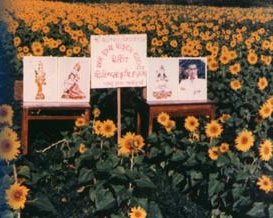Yogeshwar Krishi ( Farms of God )

It is the practice of collective farming of a single field (normally of three to five acres) in a village by the villagers who each offer devotional labour, possibly for one or two days per cropping season. The resulting crop belongs to no one except God. No one can claim ownership of the produce. The labour input is the offering of the peasant in their role as priests. The wealth generated by the sale of the output belongs to God and hence Apaurusheya or impersonal. Shrambhakti (labour contributed as devotional offering) is the key instrument for generation of internal resources. The benefits of the harvest are redistributed in the village for common good as well as individual need not as loan or charity, but as divine grace (prasad). The recipient is under no obligation to repay it and definitely no interest has to be paid on such sums. Giving and receiving of these sums is done so discreetly and with such subtle grace that it obviates any sense of inferiority on the part of recipients.